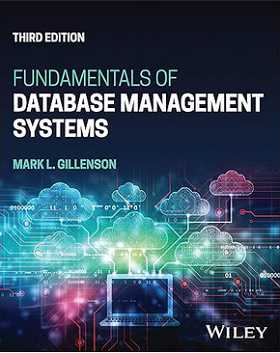| Fundamentals of Database Management Systems |
|
Author: Dr. Mark L. Gillenson This book is aimed at people taking a one-semester course in database management as part of their larger information systems management course. As such, it deliberately sets out not to be encyclopedic but to provide a firm grounding. Gillenson starts with a look at data as the new corporate resource, looking at data through the ages and how it is used in today's information systems.
Chapter three introduces the concept of a database management system, but if you were expecting a description of tables, columns, records, you'd be confused. There is a discussion of files and records in terms of how data used to be stored, but the chapter then moves on to data as a manageable resource, data integration and redundancy, control issues, and data independence. The next chapter is on the use of SQL for relational data retrieval, with sections on each of the main parts - Select, the basic functions, grouping, joins and subqueries. The chapter ends with examples. A chapter on the relational database model comes next, describing the concepts and how to retrieve data from a relational database. A further chapter discusses additional concepts such as the relational structures for one-to-many and many-to-many relationships, and referential integrity. Logical database design (entity-relationship diagrams and how to convert them into relational tables) is the subject of the next chapter, and this is followed by a look at physical database design. The author starts by a very high level view of disk storage, then discusses indexes and hashed files, what you might consider for physical database design, and how to change a design by splitting tables, adding attributes, and adding new tables. A chapter on object-oriented database management gives a very high level overview that essentially concludes object databases vary a lot. Data administration in terms of its advantages and responsibilities is the next topic to be considered, along with data dictionaries. A chapter on security, backup and recovery sets out the potential choices, with some discussion of the different types of security breach. Data warehouses are then introduced, with a good chapter setting out the concepts, types of data warehouse, how to go about building and using them. The final chapters look briefly at NoSQL, blockchain, databases in the cloud, and database applications. I have mixed feelings about this book. I definitely wouldn't recommend it to a developer. For the suggested audience of people taking a semester course on information systems, there are good parts, but also places where I didn't think the author provided enough in terms of clarity or an easy way in. It has more of the feel of being the background reading to accompany a series of lectures where those elements would be supplied. In conclusion, it would be an interesting addition to other books, but you'd need to read more elsewhere. To be informed about new articles on I Programmer, sign up for our weekly newsletter, subscribe to the RSS feed and follow us on Facebook or Linkedin.
|
|||
| Last Updated ( Tuesday, 06 August 2024 ) |

